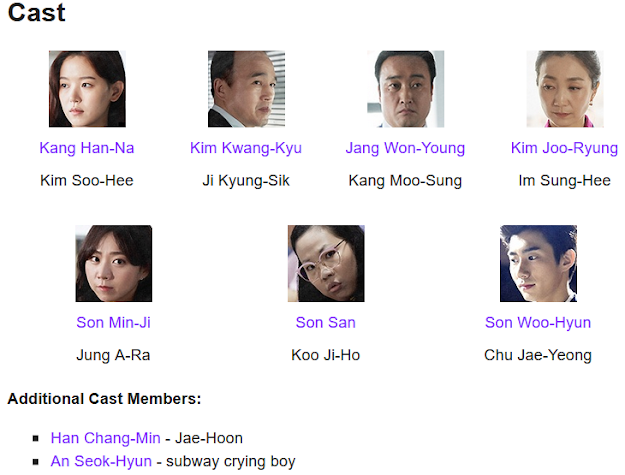This whole story is a parable. It is a harsh critique of the Korean society, and in extenso, any society to be honest.
Suhi works at the logistic company that is actually a society in itself. The stratification is obvious - from the boss to the people who actually do the deliveries, who are treated as a lesser group just because, as one of them says: "they are not as educated as them [the white collars]." Which of course mirrors the real life treatment of people doing a manual labor. And even though some experts say that Korean society gets more and more divided between the upper class that has privileges and the lower class, the "dirt spoons", this is not only a Korean problem. It is pervasive everywhere. Just listen how people talk about the workers who deliver groceries, who take out the trash. Their work is seen as something lesser than sitting in an office and writing in Excel all day (I'm exaggerating, I know).
Then one day, Suhi's ear starts bleeding and after some time she realizes it's a reaction to something she hears which isn't pleasant. This is a symbolic physiological reaction to societal pressure. It's not a violent spewing of blood, but a trickling drops of blood, showing that her inner tension rises but is unable to find an outlet.
Her life seems empty and devoid of any stimulating events. She follows
the regular, normal adult path just like everyone else - she graduated,
has a job and in few days she's getting married. And then this path
starts to flicker and we see through her eyes that it was just a mirage,
a role that she had to play. People at work can't understand her
condition and think she's rude for covering her ear the moment blood
starts dripping because they spew some nonsense. They label it as mental
illness, showing how little the society cares about the actual mental
illness problem, sticking the name to anything that deviates from the
"norm" in a manner that would make Foucault proud.
 |  |
People in her office tell her to suck it up, to withhold her real
thoughts and wishes, to persevere, to cave in and continue living
because that's what everyone is doing. So she does and her ear bleeds
and bleeds. She puts up with a noisy neighbor upstairs, she puts up with
a guy singing (badly) on the roof, she puts up with co-workers and her
boss, she exacts petty revenges like a child on the delivery guy. She's
putting up with her soon-to-be-husband because the society demands she
gets married and have kids. And when asked, her friend tells her bluntly
- even if you love your kid, their crying can make you go mad
sometimes. So she talks about having kids with her fiance and she states
that she wouldn't want them because she fears she might bleed to death.
In a rare moments he takes his eyes off the phone screen with a game,
he replies that "then there's no reason for them to be together". And
this actually is that snowflake that starts the avalanche.
She tries to focus on something nice during her wedding ceremony, just to not hear the drilling about the duties, country etc. So she's doing some math (slightly insulting the official, because of the Korean pronunciation of the number 28) and sings Aegukga in her head but only when she sees some butterfly she realizes she wants the same thing - to just be free, even if for a short time. Her ear bleeds again and - as we can see - for the last time, because she severs any ties to her previous self from just few minutes before. She stops the marriage and leaves the venue with a smile.
Then we have her victory tour - she speaks freely, she owns up to her mistakes, she apologizes or defiantly states her agenda. To her ex-fiance's words that she humiliated him and ruined the day, she replies something wonderful - that he lost HER, but focuses on how HE was perceived. And he wasn't even curious why.
The episode was full of Suhi's inner monologues - she either imagined some situations in which she would react freely, just like she wanted, but in reality she just bowed and stayed silent. And I think this story showed it perfectly - that you can stay silent only for that long.
So as I said, the bleeding doesn't need to be taken literally - it can be as well a symbolic representation of the oppression and suppression. The blood, that life itself, can be trickling away from us because we yield to pressure to conform to outdated norms and mores. It was really strong message.









